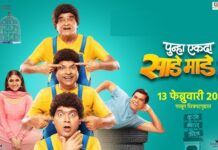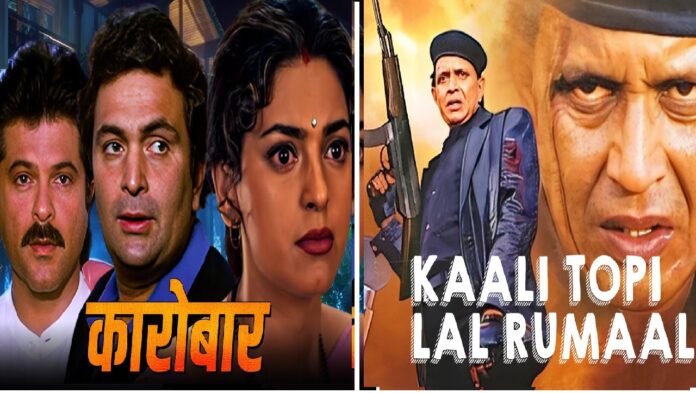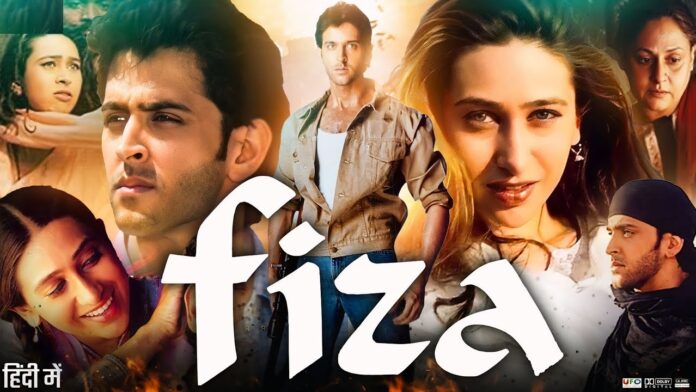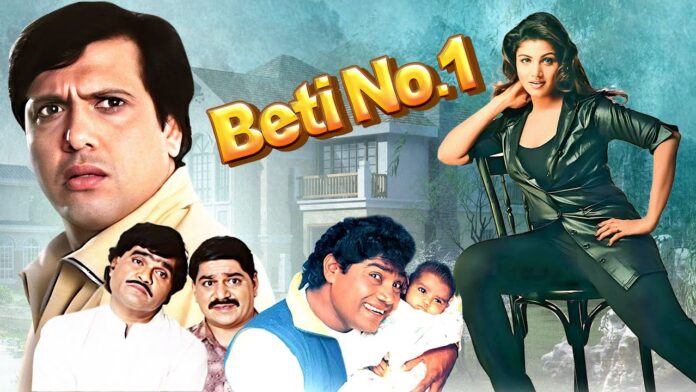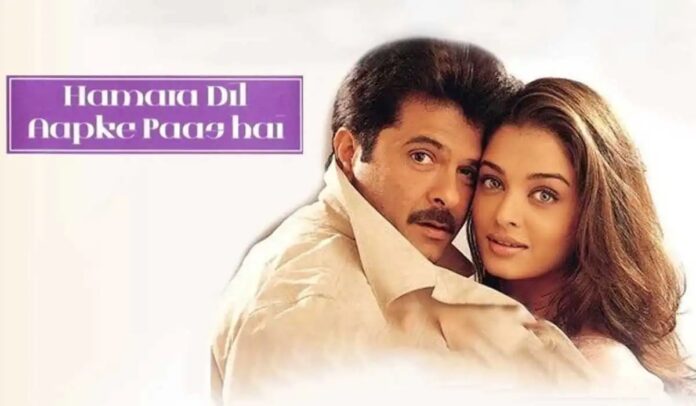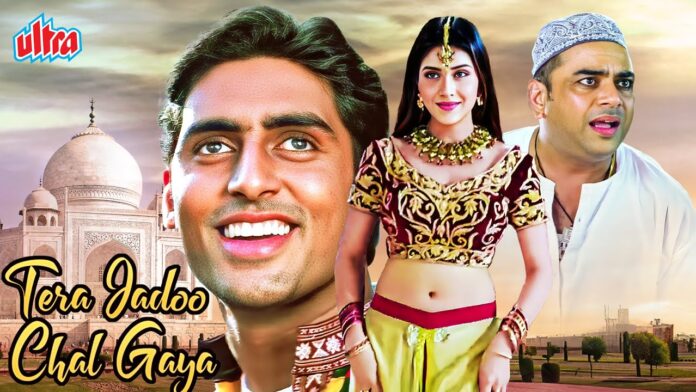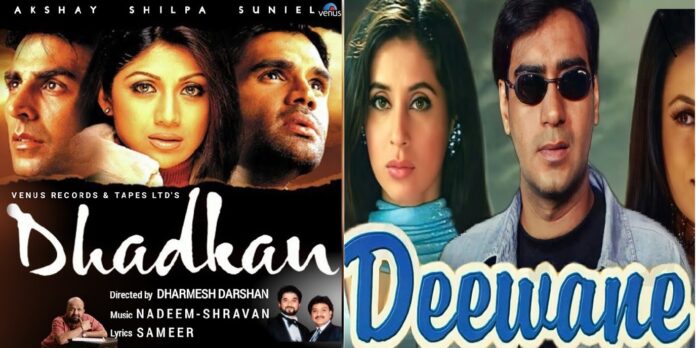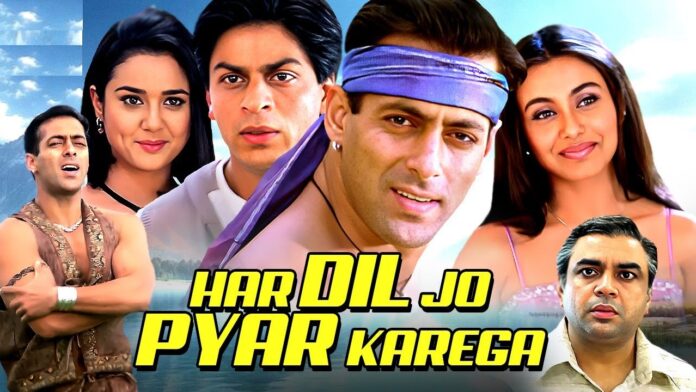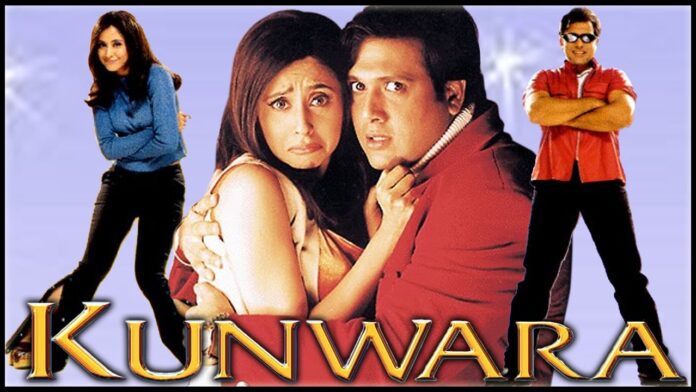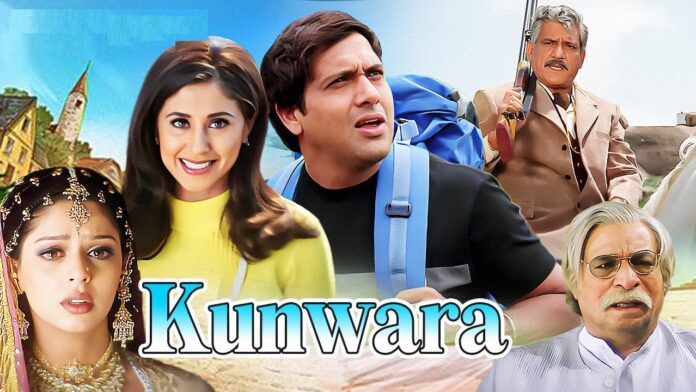KAROBAAR
TVM International’s Karobaar is a story of a young middle-class man and a young girl who is the daughter of a tawaif. The two fall in love, but a rich business tycoon sets his eyes on the young girl. Although not intending to marry her, he does want to have a good time with her and tries to woo her with all the wealth and power at his command. Of course, the girl spurns the businessman’s monetary offer to sleep with her. This agitates the businessman so much that he gets down to creating a rift between the two lovers. He achieves his goal to an extent, more so because he is the friend of the middle-class man. Anyway, the two lovers get married and begin to lead a happy life but even then, the tycoon tries to woo his friend’s wife to boost his bruised ego on being rejected. Ultimately, one day, the lady is forced to offer herself to the guy for his price. But her selflessness and undying love for her husband brings about a change of heart of the businessman. He helps her monetarily but gives up the very thought of having a relationship with her. Misunderstandings, however, arise between the husband and wife and the latter is forced to leave her house, pregnant with her husband’s child. The business tycoon gives her shelter and also gives her and her child, his name. After a long-drawn courtroom drama involving a crime, the husband realises his folly in having assumed that his wife had had an affair with the businessman.
Inspired from the English film, Indecent Proposal, the film has taken many years to complete. The time lag is all too obvious in the look of the artistes, their costumes and in the continuity of the drama. All the three lead artistes are middle-aged now, and the middle-class youth (Rishi Kapoor) romancing the young girl (Juhi Chawla) looks ridiculous, to say the least! Coincidences are aplenty in the film, a lot looks unbelievable, and the pace is rather slow. In fact, the whole angle of the businessman (Anil Kapoor) wanting to have an affair with the girl looks unbelievable, largely due to the age factor of the cast and the time lapse in the film’s making! Sachin Bhaumick and Ravi Kapoor’s screenplay is dull, but Sagar Sarhadi’s dialogues are very good, at places.
Rishi Kapoor acts well but a hero half his real age (!) was the demand of the character. He looks very stocky in several scenes. Anil Kapoor also does well as the lusty playboy businessman. Juhi Chawla has her moments of inspired acting, especially in emotional scenes. The supporting cast is just about average. Tinnu Anand, Aasif Sheikh, Himani Shivpuri, Suresh Chatwal, Asrani, Sulbha Deshpande, Navin Nischol (guest), Ram Mohan, Raj Tilak, Devyani Bedi and Inder Khosla pass muster. Priya Arora and Dinesh Hingoo are somewhat better.
Rakesh Roshan’s direction is good but, obviously, even he has not been able to lift the drama to any appreciable level, thanks to the insipid screenplay. The computer-generated image of a young Rishi Kapoor in the climax looks like a joke, though unintended. Music (Rajesh Roshan) is reasonably good but not of the kind which appeals to the audience today. Song picturisations are ordinary. Foreign locations are beautiful and camerawork (Sameer Arya) is fair. Action is functional. Editing is so-so.
On the whole, Karobaar is a poor show largely because of the delay in its making.
Released on 15-9-2000 at Liberty and 18 other cinemas of Bombay thru Dilsa Distributors. Publicity: fair. Opening: dull. …….Also released all over. Opening was weak everywhere.
KAALI TOPI LAAL RUMAAL
Tridev Films Associates’ Kaali Topi Laal Rumaal is the story of a patriotic military commando officer. The commando is being targeted by the terrorists as he thwarts the terrorists’ attempts to smuggle in arms and carry out subversive activities in the country. While the commando’s mission continues, the story thereafter brings in the track of the commando’s long-lost brother who is a small-time criminal. And then, there is an angle of twin sisters. One sister is the commando’s wife. Her look-alike is planted by the terrorists to fish out the military secrets from the commando’s closet (reminds of Raakhee’s double role in Sharmilee). The subject could have been shaped into an inspiring patriotic film, but the screenplay bogs it down due to predictable goings-on throughout, except in the concluding reels. Some dialogues are patriotic. Most of the confrontation scenes are too verbose and hardly action-oriented.
Mithun Chakraborty has done well. Kamal Sadanah, as Mithun’s long-lost younger brother, is fair. Rituparna Sengupta, in a double role, is average. Newcomer Zeenat shows promise. Mohan Joshi’s villainy is routine. Johny Lever’s comedy is feeble. Ranjeet, Tej Sapru, Ram Mohan, Satyen Kappu and Farida Jalal provide average support. Alok Nath is so-so.
Direction is poor. Musically, quite good. Cinematography and other technical aspects are okay.
On the whole, Kaali Topi Laal Rumaal has very little appeal and its box-office prospects are, therefore, extremely bleak.
Released on 15-9-2000 at Dreamland and 8 other cinemas of Bombay thru Regal Films Enterprises. Publicity: fair. Opening: dull. …….Also released in Delhi-U.P., East Punjab, C.P.C.I., Rajasthan and Nizam.
LATEST POSITION
FIZA has done extraordinary in Bombay, Delhi and Hyderabad. At most other places, where it managed a great start only due to the popularity of Hrithik Roshan, collections dropped down from fourth day onwards, after the initial fizz died down. In circuits like East Punjab, parts of U.P., Bengal, Bihar, C.I. and Rajasthan, the drop was very pronounced.
Fiza 1st week Bombay 67,30,958 (96.43%) from 12 cinemas (7 on F.H.), Vasai (gross) 4,87,127 (90%); Ahmedabad 26,65,054 from 6 cinemas, Rajkot 3,13,609, Jamnagar 1,57,534, Adipur 1,51,201 (69.01%), Bhuj 1,35,883 (58.80%); Pune 17,45,978 from 4 cinemas (1 in matinee), Solapur 2,51,860, Satara 2,87,370 from 2 cinemas (1 in matinee); Delhi 90,24,277 (85.10%) from 14 cinemas (2 on F.H.); Kanpur 5,38,377 from 2 cinemas, Lucknow 8,99,248 from 2 cinemas, Agra 2,62,000, Varanasi 2,90,670, Allahabad 3,10,800, Bareilly 2,20,530; Calcutta 24,22,707 from 10 cinemas; Nagpur 7,96,385 from 3 cinemas, Jabalpur (6 days) 2,46,739, Amravati 2,57,056, Akola 2,11,483, Raipur (6 days) 2,15,849, Durg 1,14,210, Wardha 1,11,989, Rajnandgaon (gross) 1,01,079, Chandrapur 2,53,626, Yavatmal (gross) 1,41,086, Bilaspur 2,03,647; Indore 4,13,000 from 2 cinemas (3 on F.H.), Bhopal 1,20,250 (2 unrecd.); Jaipur 10,10,657 (62.71%) from 3 cinemas, Ajmer (29 shows, gross) 3,09,023, Bikaner 2,09,126 (1 on F.H.); Hyderabad (gross) 49,00,021 from 14 cinemas (12 on F.H.), share about 33 lakh.
………..
Hamara Dil Aapke Paas Hai 3rd week Bombay 24,62,492 (61.62%) from 9 cinemas (9 on F.H.); Ahmedabad 11,47,063 from 5 cinemas, Rajkot 1,56,660 (1 in matinee on F.H.), Jamnagar 83,735; Pune 11,02,917 from 5 cinemas, Solapur 1,71,376 from 2 cinemas (1 in matinee), Satara 92,446; 2nd week Hubli 1,67,954 (1st 2,38,967), Belgaum 87,265 (1st 1,37,819), Dharwad 64,387 (1st 94,606); 3rd week Delhi 22,53,924 from 10 cinemas; Kanpur 1,99,834 from 2 cinemas, Lucknow 3,08,392 (2nd 4,16,592), Agra 2,45,000, Varanasi 1,19,600, Allahabad 1,05,602; Calcutta 4,60,642 from 3 cinemas; Nagpur 1,56,627 from 2 cinemas, Jabalpur (6 days) 63,930, Amravati 1,29,733, Akola 84,677, total 3,61,477, Raipur (5 days) 76,629 (2nd week 1,33,201), 3rd week Jalgaon 1,12,512 (2nd 1,57,172), Wardha 43,154, Chandrapur 88,390, total 3,58,149, 1st week Yavatmal (4 days) 67,045; 3rd week Indore 1,89,351 from 2 cinemas, Bhopal 82,143; Jaipur 6,31,335, Ajmer (28 shows) 58,218, Bikaner (19 shows) 43,530; Hyderabad (gross) 3,80,159 from 2 cinemas.
Tera Jadoo Chal Gayaa 4th week Bombay 3,62,917 (40.55%; 4 unrecd., 5 on F.H.); Pune 2,78,476 from 3 cinemas, Solapur 83,937; Delhi 3,36,705 from 3 cinemas (1 on F.H.); Kanpur 24,496, Lucknow 1,86,763 (3rd 2,86,006), Agra 59,485, Allahabad 45,000, Bareilly 37,786 (3rd 50,152); Calcutta 1,22,195; Nagpur 52,707 from 2 cinemas, Jabalpur 16,253, total 2,30,499, 4th week Amravati (6 days) 35,377, 3rd week Akola 46,123, total 2,80,400; 4th week Bhopal 29,995; Jaipur 1,07,907; Hyderabad (gross) 1,66,937; 1st week Guntur (gross) 83,673.
‘MOHABBATEIN’: IN 3 SHOWS ONLY
Yash Chopra’s Mohabbatein will have a running time of 3 hours and 38 minutes. Its length is 5,968.92 metres in 20 reels.
Since it is such a lengthy film, it will be screened in only 3 shows daily in cinemas across the country. The film is due for release on Diwali (27th October).
Yash Chopra has informed all his distributors of this fact. His all-India distributors were in Bombay earlier this week. They were also treated to a screening of two songs of the film.
As regards Aishwarya Rai, she will feature in the film’s publicities later. Currently, director Aditya Chopra is giving prominence to Amitabh Bachchan, Shah Rukh Khan and the six young artistes in the film’s promotional trailers.
VIDHU VINOD CHOPRA ACCUSED OF COPYRIGHT INFRINGEMENT
Producer-director Vidhu Vinodh Chopra has been accused of copyright infringement by Shantiveer Kaul, son of famous Kashmiri poet Dina Nath Nadim, for allegedly lifting a song of Mission Kashmir, from his father’s famous work, Bumboor Yamborzal. Kaul has asked the filmmaker to delete the song Bumbro Bumbro from Mission Kashmir immediately. On failure to do so, action for both, civil and criminal liabilities, would be initiated against him (Vidhu Vinod Chopra), said Shantiveer Kaul in a legal notice sent to the filmmaker. Kaul has also claimed his right in the sale proceeds of the music of the song Bumbro Bumbro in the film.
BENGAL TECHNICIANS ON INDEFINITE STRIKE
Technicians of the Bengal film industry struck work from 8th September, demanding a hike in wages. According to the chairman of the producers’ wing of the Eastern India Motion Picture Association (EIMPA), Krishna Narayan Daga, “While the technicians want a 30% hike in wages for TV serials, their demand for films is a hike of 50%.” He complained, “The technicians demand a hike, but do not observe the code of conduct which was formulated by us some time back and was also approved by them, causing loss of lakhs of rupees to the producers.”
A joint action committee has been formed by the EIMPA and local bodies, Association of Television Affiliates (ATA) and Artistes’ Forum, to tackle the problem and formulate another code of conduct for the technicians.
In the meantime, all production activity has come to a halt in West Bengal following the indefinite strike.
YOU ASKED IT
Why is filmmaking considered such a risky business? Is it because of lack of discipline and order or is it because of some other reasons?
– First and foremost, because equations in the industry change every Friday. Nothing is stable!
Why are multi-star cast films not being produced as frequently as in the mid-’70s and ’80s? Is it because of non-availability of subjects or because of the high-risk factor?
– Obviously, because of the high-risk factor. Even solo starrers cost a bomb today to produce!
Did the first talkie film, Alam Ara, have any songs? On which date was it released in Bombay?
– Yes, it had 12 songs. It was released on March 14, 1931 at Bombay’s Majestic cinema.
DO YOU KNOW?
* A new company — Yash Raj P.P. Associates — has been formed to release Yash Chopra’s MOHABBATEIN in Delhi-U.P. Obviously, Yash Chopra is a partner in the company.
MIX MASALA
FANATICISM
Fiza has been banned in Malayasia. Reason: “A Muslim cannot be a terrorist.” That’s the notion among the Malayasian officials, that led to the ban on the film! No need to explain that Hrithik plays a Muslim terrorist in the film.
CENSOR NEWS
Yash Raj Films’ Mohabbatein (length 5968.92 metres in 20 reels) was applied on 12th.
Inderjit Films Combine’s Dhaai Akshar Prem Ke (length 4537.29 metres in 18 reels), applied on 13th, was seen on 15th.
Tridev Films Associates’ Kaali Topi Laal Rumaal (social) was given C.C. No. CIL/2/31/2000 (UA) dt. 8-9-2000; length 3732.43 metres in 17 reels (cuts: 59.20 metres).
REGIONAL FILMS
Pooran Entertainment’s Mor Chhainha Bhuinya (Chhattisgarhi; social) was given C.C. No. CIL/1/52/2000 (U) dt. 8-9-2000; length 2975.18 metres in 14 reels (no cut).
Kosta Films’ Dulhin Bani Mor Bahiniyan (Bhojpuri; social) was given C.C. No. CIL/2/32/2000 (UA) dt. 8-9-2000; length 4297.14 metres in 15 reels (cuts: 61.39 metres).
Paramount Films’ Mission Impossible 2 (Tamil; dubbed; action thriller) was given C.C. No. CFL/3/131/2000 (A) dt. 13-9-2000; length 3415.80 metres in 13 reels (no cut); Mission Impossible 2 (Telugu; dubbed) was given C.C. No. CFL/3/132/2000 (A) dt. 13-9-2000; length 3415.80 metres in 13 reels (no cut).
BMPA Gets Tough
Upper Limit Of Price For Bihar-Nepal Locked At 50 Lakh
At an extraordinary general meeting of the Bihar Motion Picture Association (BMPA), held on 9th September in Patna, it was resolved that no distributor would henceforth pay more than Rs. 50 lakh for any film’s distribution rights for Bihar-Nepal. If a distributor was found violating this decision, it was decided to take disciplinary action against him at the Association level.
The move comes in the wake of failing films which have been putting distributors of Bihar and Nepal to losses. There is also a growing resentment among distributors of the circuit against the tendency of some top producers and directors to make films which hold appeal mainly for the Overseas territory and the city audience. Such films generally don’t do well in circuits like Bihar-Nepal. While distributors don’t mind producers and directors making films of their choice since it is their prerogative to decide what should or shouldn’t be made, their only grouse is that prices of films should not be fixed in the old and established ratios if the appeal of the films is not universal.
The BMPA had, a couple of years ago, passed a similar resolution to check the high prices, distributors were offering for films. The implementation of the resolution was found to be difficult. It would now have to be seen how seriously a similar resolution is given effect to.
Some utterances of West Bengal and Bihar distributor Pritam Jalan were also the subject matter of the extraordinary general meeting. Some exhibitors complained that Jalan had tried to destroy the unity of the Association. The BMPA unilaterally put a ban on Pritam Jalan. If carried out, the ban could mean that no exhibitor would screen Pritam Jalan’s films in Bihar. Jalan’s first release in Bihar would be Mohabbatein.
‘Tera Mera Saath Rahen’
Babloo Pachisia Tries His Hand At Something Different… But Commercial
Shooting on a spacious office set, erected by art director R. Varman on the lawns of Horizon Hotel at Juhu, Bombay, for Babloo Pachisia’s Tera Mera Saath Rahen is progressing at a leisurely pace. It is just the third day of shooting, the film having been launched on 11th September on the very set. Ajay Devgan is the only guy working in his office, while other staffers are making fun of his conscientiousness “Sharmaji, woh petty cash voucher kahan gayaa?”, bellows Ajay who has, in real life, lost a lot of weight.
Mahesh Manjrekar is directing the film which is based on his own story. Ajay Devgan plays the male lead in it, and Sonali Bendre will be playing his heroine. Namrata Shirodkar also plays a leading role.
Tera Mera Saath Rahen is the story of two brothers, the younger of who is physically handicapped and mentally retarded. The film deals with the relationship between the two brothers and their love for each other. Ajay Devgan plays the elder brother. An 11-year old boy is yet to be finalised to play the handicapped younger brother. Mahesh Manjrekar is keen that as soon as the boy is pencilled to enact the difficult role, he be sent to a school for the mentally challenged children so that he can observe them.
Producer Babloo Pachisia informs that Mahesh Manjrekar had narrated him four or five subjects of which he liked two, one being Tera Mera Saath Rahen. “Mahesh’s personal favourite was this particular one,” continued Babloo, “and, therefore, I opted for it. After all, the director’s conviction is what ultimately counts.”
For Babloo, Tera Mera Saath Rahen is quite a departure from his brand of action films (Ziddi, Haqeeqat, Arjun Pandit). This one is an emotional tale. Continues the producer, “Ajay Devgan plays a middle-class working boy who lives with his younger brother. He dotes on the kid. Comes a stage in his life when he has to choose between his girlfriend and his kid-brother. He thinks of a via media — he puts his brother in a home for the mentally challenged.” The kid-brother takes his brother’s girlfriend to be the vamp in his life and the cause for all his sorrows. The mental trauma of the two brothers that follows their separation should have the audience weeping in the cinema halls.
In a brief chat, Mahesh explodes the myth that he has umpteen number of films on hand for direction. “Astitva and Jis Desh Mein Ganga Rehta Hai are complete,” he says. “Kurukshetra is nearly over. Sony’s film, Pyar Kiya Nahin Jata, is also nearing completion. So, the only two films currently on the sets are this one and Time’s new film.” The muhurts of both the films were held on 11th September. Manjrekar explains this thus: “Actually, only Tera Mera Saath Rahen was to be launched on 11th, Time’s film was to follow in a few days. But because of the shraddh period, we decided to perform that muhurt also on 11th and we did it right here.”
Mahesh talks very fondly of his Jis Desh Mein Ganga Rehta Hai. “That film is my pyaara bachcha,” he says, love oozing out of his voice. “It is like that kid of the parents who, without much effort on him, will ensure that he gets distinction marks in the examinations.” Manjrekar has completed Jis Desh Mein… in just 35 days!
Even though Tera Mera Saath Rahen is a film of middle-class people and their values, Pachisia will not compromise on the making of the film. “Yes, the songs will be picturised on beautiful foreign locations,” he announces. “How the director achieves to balance this is his headache,” jokes Pachisia.
Babloo has already clinched the deals for the distribution rights of his film for Bombay, Delhi-U.P. and East Punjab. Audio rights, too, have been sold, he informs. The film, he reveals, will be distributed in Bombay territory by Ajay Devgan’s office, but “Ajay has paid us a price just as we have paid him his price,” adds Pachisia.
3-E
Education-Entertainment-Enlightenment
Tit For Tat!
This one is a true story. The Delhi-U.P. distributor of a forthcoming film spread the news in his circuit that another film, scheduled for release simultaneously with his film, had been postponed. The Delhi-U.P. distributor of the other film, obviously, did not approve of the former’s stories which had spread like wild fire and thereby created panic. Not the one to take things lying down, the distributor of the other film played a smarter trick. He despatched telegrams to about 10 cinemas of U.P., where the first distributor’s film was booked, announcing that the booking needed to be cancelled as the film’s release was postponed. Of course, nothing serious happened. Only thing, panic buttons were pressed and the first distributor’s office was flooded with calls to verify the veracity of the telegrams. Cute game, some would say! Tit for tat, others would say. Very nasty, some would insist!!
This Karobaar Of Distribution!
Gava’s Karobaar almost did not release in Delhi-U.P. yesterday. Distributor Muni Raj pleaded inability to arrange the delivery amount and sought a rebate in it. Even the reduced amount could not be arranged by him as he did not get any MGs or FHs from the cinemas of Delhi and U.P. In fact, till Thursday, barely one or two cinemas of Delhi had been booked by the distributor. Seeing red, producer Gava asked friend Tolu Bajaj to come to his rescue and release the film through his Mukta-Shakti Combines. The release in Delhi-U.P. is, therefore, haphazard. The C.I. distributor, too, pleaded inability to take delivery at the contracted price and had, therefore, to be given delivery for a pittance. On the other hand, Bombay distributor Dilip Dhanwani had, long ago, relinquished the rights in the film and he re-acquired them after a while.
Title Tattle
Talk of coincidences and you can’t ignore the Hindi film industry. Every now and then, there occur things that baffle one’s imagination. How else do you explain Rakesh Roshan’s much-delayed Karobaar and another of Mithun’s conveyor-belt product, Kaali Topi Laal Rumaal, releasing on the same day (15th September)? Didn’t get it? Years ago, when Karobaar was launched, guess what it was called? Yes, it was originally titled Kaali Topi Laal Rumaal!
INFORMATION MEETS
“As a producer, you can give ideas and can get them implemented. There’s immense job satisfaction one can experience by producing a good film.”
– B.L. SABOO
KOMAL NAHTA
It is the glamour of the film industry that attracts many a newcomer to this world of making and selling dreams. So when a businessman makes a calculated business decision to enter the domain of filmmaking and, in this decision, is not lured by the glitz and the glamour, it means, he is a serious player. One such entrant in the world of movie production is industrialist B.L. Saboo who has partnered Rahul Rawail in the latter’s under-production film, Kuch Khatti Kuch Meethi.
Excerpts from a conversation — baatein, kuch business ki, kuch aise hi:
What prompted you to venture into the territory of film production?
– We are in the ICE age. While I’ve already started an information technology business and hope to some day get into Communications too, the ‘E’ of the ICE, viz. Entertainment lured me because I saw a lot of potential in the entertainment business. Two out of three is good enough, you would agree.
What potential did you see?
– Hindi films are popular the world over. People living abroad feel connected to India only through films. Business of Hindi films abroad is only going to grow in the days to come. Besides, the film industry is not at all a bad place to be in. We outsiders did not have the right picture of the industry. But once in it, I can say from my personal experience that, if treated like any other profession, filmmaking, too, is a good business with a big potential. Media is going to play a big role in communications and connectivity.
Which means, your entry into the industry is a calculated move?
– I won’t say, ‘calculated’. But you’ve got to update yourself and move ahead with the times.
Is it also for the glamour associated with films?
– In media, you have the popularity which is the glamour aspect. Films is the fastest route to get popular.
So, you are looking for that quick popularity?
– Not exactly. In Punjab and Chandigarh, I’m known as an industrialist. By virtue of my LPG cylinder business, Saboo is a household name in Northern India. We are the largest LPG cylinder manufacturers in Asia and the third largest in the world. In the LPG faculty, I’m known the world over. Last October, I had organised an LPG conference in Delhi and it was a very successful event. It was for the first time that an international forum of this kind took place in India. A similar forum will be held in the USA this year.
Having decided to come into films, how did you make the choice to partner Rahul Rawail?
– Rahul is a good friend of mine. We’ve known each other since 20-25 years. It is always better to enter a new field with a known person or friend than with somebody else. Rahul is an established director in the industry.
About our film, Kuch Khatti Kuch Meethi, I can tell you, it will be quite different from other films you see these days. I say this not because I am the joint producer with Mrs. Rahul Rawail but because I am a cinegoer and I know what kind of films are being made nowadays. All said and done, our film will be a great entertainer.
So you have been a keen cinegoer, have you?
– I love films and I watch a lot of them. My childhood ambition was to become an industrialist and I realised that dream years ago. Film business is also an industry. It is a creative industry.
But creativity is restricted to writing and direction…
– No, I don’t agree with you. As a producer, you can give ideas and can get them implemented. There’s immense job satisfaction one can experience by producing a good film.
Have you been creatively involved in the making of this film?
– I did partake in the discussions but this being my first film, I’ve not poked my nose — so to say — too much. But I could see that things were going in the right way.
Give us one instance of your creative input in the project.
– I believe in quality of life. From day one, I told Rahul, the quality of the film should not be allowed to suffer under any cost. And this suggestion of mine is being followed sincerely.
Tell us something about your other business enterprises.
– When I was a child, we had coal mines in Bihar. I helped my dad in coal trading but my heart was not in that business. As I said earlier, I always wanted to be an industrialist and so, I quit my dad’s business and moved from Jharia and Asansol to Delhi. I tried setting up an industry in Himachal Pradesh, Rajasthan and Haryana and it was only because I got the first clearance from Himachal Pradesh for manufacturing gas cylinders that I started out there. My Saboo Cylinders Ltd. is now 18 years old. Besides this, I have other companies like Saboo Itech.com Ltd., Saboo Lime & Cement Ltd., Saboo Alloys (P.) Ltd., etc. My group employs 3,500 people and the turnover in 2000 is expected to be Rs. 250 crore. My cement plant is in Punjab. My IT business is based in Delhi, and I’ll soon be going global with it.
Will you be making your future films with Rahul only, or will you be looking elsewhere too?
– So long as it is smooth sailing with Rahul, it will be only with Rahul. (Laughs) I don’t want to have too many trials and tribulations.
What do you find lacking in the film industry as against other industries?
– According to FICCI, India’s earnings from just IT exports by 2005 will be Rs. 15 billion. Why can’t there be a sizeable earning from film exports? See Hollywood! People in Bollywood need to be trained in professionalism. There must be seminars organised to inform film people of the advantages of professionalism, of discipline, of organisation. In other industries, we have seminars and international fora for educating people. This is what is required in the film industry too. If you do things professionally, the industry is a lovely place to be in. And I tell you, the day we strive to make this business a veritable industry, it will be a money-spinner…



